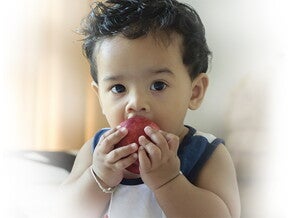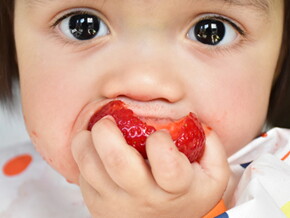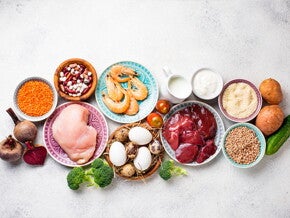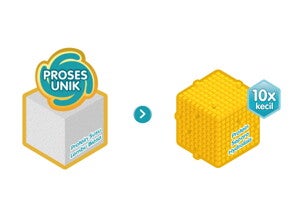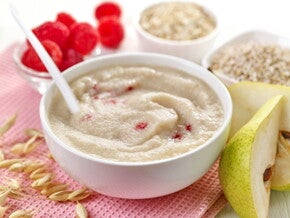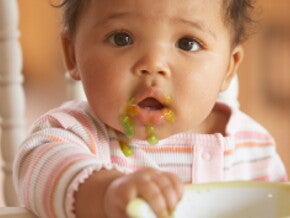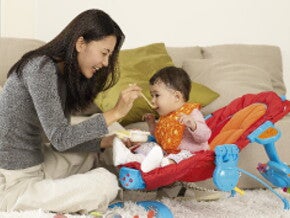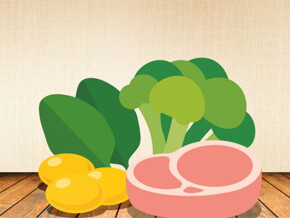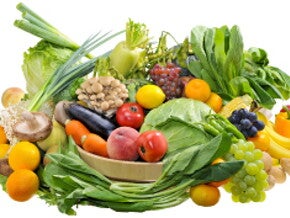
As a parent, you may be often worried about whether your child is getting enough iron daily. However, on the other hand, you may also be concerned about providing too much iron for your child. Unlike some other nutrients, there is a risk of too much iron-rich foods for kids.
What is iron?
Iron is an essential mineral for your child’s body. It is part of haemoglobin in red blood cells that help carry oxygen around the body.
How do I know if my child has too much iron?
Based on the RNI Malaysia 2005, recommended daily iron intake for children aged 6-11 months is 9 mg/day7-8. Iron-rich food such as spinach contains up to 0.04mg per 100g of bioavailable iron, or iron that is available for absorption. Broccoli contains up to 0.21mg per 100g of bioavailable iron9. If you are concerned about having too much iron for your child, you can plan your child’s diet with calculated amounts every day.
Should I remove all iron-rich foods from my child’s diet?
While there is risk of too high intake of iron, there is still the risk of too little iron. Findings suggest that iron deficiency during your child’s growing years may affect cognitive development1. Iron deficiency can lead to poor cognitive development and chronic iron deficient children are 3 times more likely to drop out of school or have no further education and training2. Iron deficiency anaemia affects your child’s body and brain development1,3, and increases the risk of infectious diseases4-5.
What can you do?
As a meal provider for your beloved child at home, you can complement your child’s daily diet with iron rich complementary baby food. For example, one serving of CERELAC infant cereal contains minimum 5mg of iron; with your usual home-cooked food this should able to meet the Malaysian Recommended Nutrient Intake (RNI) of Iron for children aged 6 – 11months which is 9mg a day7.
It is made with Nestlé patented method to break down carbohydrates in the cereals into smaller units, thus making them easier to digest. It also contains BIFIDUS BL probiotics to help increase the number of beneficial bacteria in the gut.
What’s more, the rice used in CERELAC infant cereal is sourced from paddy fields in Alor Setar, managed by Nestlé Paddy Club, an initiative where Nestlé works with local farmers through a rice-growing sustainability innovation that uses environmental-friendly approaches for the manufacturing of Nestlé infant cereal.
All in all, planning your child’s diet with a variety of food in the right balance should help set the foundation for a healthy growth. Remember, your child’s growing years are a journey of spending time together and learning about each other.
IMPORTANT NOTICE: Not to be given to infants below 6 months of age unless advised by health professional. For optimal infant health, breastfeeding should continue up to 2 years of age along with complementary food. Nutritious complementary food such as rice, fish, meat, chicken, lentils, vegetables, and fruits can be introduced to infants at 6 months of age. NESTLÉ CERELAC Infant cereal can be part of the infant’s varied diet.
References
1. Black, M. M., Quigg, A. M, Hurley, K. M. & Reese Pepper, M., iron-deficiency anemia in the first two years of life: strategies to prevent loss of developmental potential. Nutrition Reviews, 2011, 691Suppl. 1l, pp. S64-S70
2. Lozoff B, Smith JB, Kaciroti N, Clark KM, Guevara S, Jimenez E. Functional significance of early-life iron deficiency: outcomes at 25 years. J Pediatr. 2013 Nov;163(5):1260-6
3. Lozoff, B., iron deficiency and child development. Food and Nutrition Bulletin, 2007, 28(4 (Supplement)), pp. S560-S571.
4. Beard, J. L., Iron biology in immune functions, muscle metabolism and neuronal functioning. Journal of Nutrition, 2001, Volume 131, pp. 568S-580S.
5. Institute of Medicine (IOM) Food and Nutrition board, Dietary reference intakes of vitamin A, vitamin K, arsenic, boron, chromium, copper, iodine, iron, manganese, molybdenum, nickel, silicon, vanadium and zinc, Washington DC, 2002.
6. Gillooly, M., Bothwell, T. H., Torrance, J. D., et al., (1983). The effects of organic acids, phytates and polyphenols on the absorption of iron from vegetables. Br. J. Nutr., 49(1), 331-342.
7. NCCFN (2005). Recommended Nutrient Intakes from Malaysia. A Report of the Technical Working Group on Nutritional Guidelines. National Coordinating Committee on Food and Nutrition, Ministry of Health Malaysia, Putrajaya.








